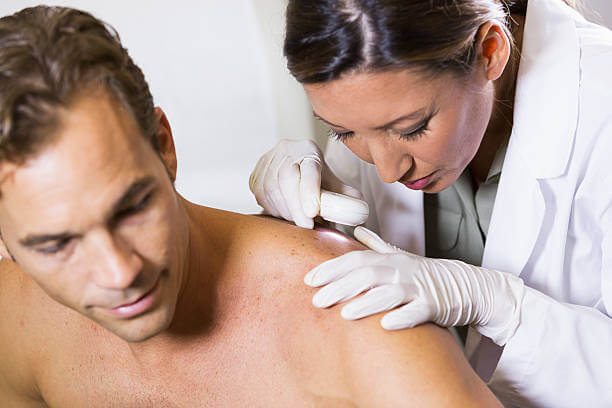Skin cancer can be a deadly condition, but the good news is that it is highly treatable when detected early. Skin cancer screening is an exam of the skin to catch melanoma or other skin cancers early, and both you and your dermatologist can keep an eye on any unusual marks, moles, or bumps. The goal is to detect cancerous lesions when they are small and easiest to treat.
Let’s talk about how skin cancer screening works, both your own regular self-checks and your dermatology checkups, and where you can go in the greater Athens area to see a world-class dermatologist.
Why Do I Need to See a Dermatologist?
You have a higher risk of developing skin cancer if you:
- Have a history of skin cancer of any type (basal cell carcinoma, squamous cell carcinoma, melanoma, etc.)
- Have skin that easily burns or freckles
- Have several moles on your skin
- Have a light skin tone, blonde or red hair, or light-colored eyes (green or blue)
- Have a history of sunburns
- Are frequently exposed to the sun for leisure activities or work
- Have a family history of skin cancer
Even if you don’t have any risk factors for skin cancer, you should be aware of any new and unusual marks or bumps on your skin, and visit a dermatologist annually for a detailed skin check. It is very common for patients to consider something potentially dangerous that is actually benign, while other issues are discovered by the dermatologist that the patient didn’t even notice.
You Can Do Self-Screenings at Home
Being proactive about your skin’s health involves performing regular skin checks at home. For this self-exam, be sure to look for any irregular growths or rough/abrasive patches on your face, ears, neck, chest, abdomen, underarms, sides of arms, underneath the breasts, fingers, palms, under the fingernails, and on top of your hands.
Use a handheld mirror to examine your entire back, scalp, buttocks, genitals, and the backs of your calves and thighs; you may need to stand in front of a full-length or bathroom mirror and use both mirrors to view these areas. Take note of what the blemishes, freckles, and moles on your skin look and feel like.
You can also check the ABCDE factors of any new marks or bumps on your skin:
- Asymmetry– One half of the mark or mole doesn’t match the other half
- The border is irregular– The growth has an irregular or ragged border
- Color is not uniform– The color of the lesion has multiple shades
- Diameter is large– The width is greater than 1/4-inch across
- Evolving– The suspicious growth is changing over time
See a trusted dermatologist if you find anything suspicious, like a change in an existing mole, pain in the mole, a sore that doesn’t heal within two weeks, or a mark on your skin that has any of the qualities listed above.
Skin Cancer Screening in Athens, GA
Early detection of skin cancer can greatly improve the prognosis, and even malignant melanoma has a 99% survival rate when diagnosed early by a dermatologist. Here at Georgia Skin Cancer & Aesthetic Dermatology, our dermatologists offer a wide range of aesthetic and general dermatology services, along with screening and treatment of skin cancer. Our dermatologists can also provide you with necessary information on how to prevent skin cancer from developing in the first place.
If you need a skin screening, diagnosis, or treatment for skin cancer, make an appointment with our dermatologists by calling us today at (706) 543-5858 or by filling out our appointment request form online now. We look forward to serving you!
